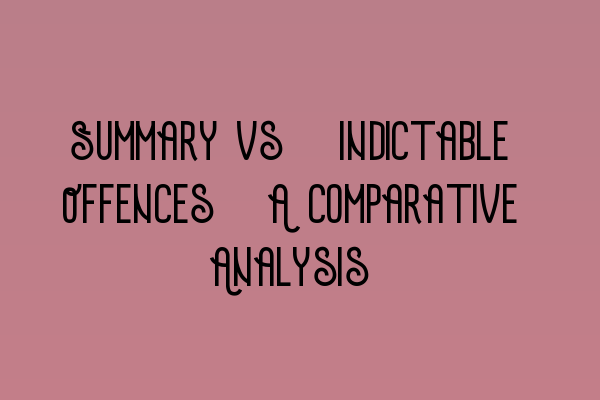Summary vs. Indictable Offences: A Comparative Analysis
As criminal solicitors, it is crucial to have a deep understanding of the different types of offences that exist within the legal system. Summary and indictable offences are two key categories that differentiate crimes based on their severity and the procedures involved in their prosecution. In this blog post, we will conduct a comprehensive comparative analysis of summary and indictable offences, outlining their characteristics, processes, and implications.
Summary Offences
Summary offences are considered less serious crimes and are typically dealt with at the Magistrates’ Court. These offences include minor traffic violations, public order offences, and simple assaults. The primary aim of summary proceedings is to resolve cases quickly and efficiently, ensuring justice is served without overwhelming the court system.
In summary offences, the role of a solicitor is crucial in providing legal representation and expert guidance to defendants. As an SQE Criminal Law & Practice law firm, we have extensive experience in handling summary offences. Our comprehensive knowledge allows us to effectively navigate the complexities of these cases, ensuring the best possible outcome for our clients.
If you are preparing to take the SQE 1 exam, it is crucial to have a solid grasp of the intricacies of summary offences. To enhance your preparation, we recommend practicing with our SQE 1 Practice Exam Questions. These practice questions will help you familiarize yourself with the types of scenarios you may encounter, enabling you to develop effective problem-solving techniques.
Indictable Offences
Indictable offences, on the other hand, are more serious in nature and are usually tried in the Crown Court. These offences include murder, robbery, and drug trafficking. Due to their gravity, indictable offences often require a more complex legal process, including jury trials and more extensive pre-trial procedures.
As a solicitor specializing in criminal law, it is essential to have expertise in handling indictable offences. At SQE Criminal Law & Practice Law UK, our team of experienced solicitors is well-versed in the strategies and tactics necessary for effective defence or prosecution in these cases.
For those preparing for the SQE 2 exam, we offer comprehensive SQE 2 Preparation Courses. These courses will provide you with the knowledge and skills needed to navigate and excel in the intricacies of indictable offences. With our expert guidance, you can confidently approach the exam and enhance your understanding of the subject matter.
Comparative Analysis
Now that we have explored the fundamentals of both summary and indictable offences, it is important to highlight the key differences between them:
- Severity: Summary offences are less serious than indictable offences.
- Court Proceedings: Summary offences are typically dealt with in the Magistrates’ Court, while indictable offences are tried in the Crown Court.
- Legal Representation: Defendants in summary offences may not be entitled to legal aid, while legal representation is generally granted for indictable offences.
- Jury Trials: Summary offences do not involve jury trials, whereas indictable offences often do.
- Sentencing: The penalties for summary offences are generally less severe than those for indictable offences.
Understanding these distinctions is vital for both solicitors and aspiring legal professionals. By possessing a comprehensive knowledge of summary and indictable offences, you can confidently guide your clients and represent their best interests throughout the legal process.
For SQE 1 candidates, we recommend taking advantage of our Practice Mocks FLK1 FLK2. These practice mocks will allow you to simulate exam-like conditions and assess your level of preparedness. By identifying areas for improvement, you can refine your skills and strengthen your chances of success in the examination.
Finally, it is essential to stay up-to-date with the latest SRA SQE Exam Dates. Being aware of the examination schedule will enable you to plan and prepare effectively, ensuring you have ample time to cover all relevant topics and maximize your performance.
At SQE Criminal Law & Practice Law UK, we are committed to providing the highest level of legal expertise and support. Whether you require assistance with summary or indictable offences, our team of dedicated solicitors is ready to guide you through every step of the legal process. Contact us today to discuss your case and learn more about how we can assist you.
